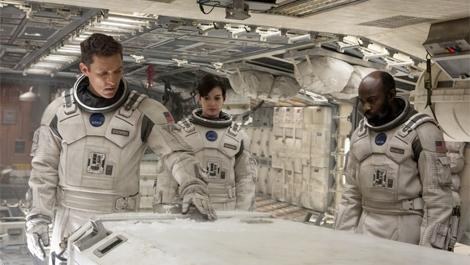Interstellar

“We’re explorers, not caretakers,” muses frustrated pilot Cooper (Matthew McConaughey) – a man born “40 years too late or 40 years too early” – near the start of Christopher Nolan’s Interstellar.
The same could be said for the director himself. Not one content to rest on his cinematic laurels, Interstellar sees Nolan (the man who rejuvenated comic-book movies with his Dark Knight trilogy and gave summer blockbuster fare a mind-bending shot in the arm with Inception) voyaging into space – and full-tilt science fiction – for the very first time. The result? Often spectacular, sometimes frustrating, infinitely ambitious…
As ever, attempting to sum up Nolan’s labyrinthine plotting (brainstormed once again alongside younger brother Jonathan) is nigh-on impossible without spoiling the twisty, time-hopping narrative and carefully crafted reveals.
The film takes place in a near-future where the Earth is slowly withering, permanently covered in a thick layer of arid dust that makes human survival at best challenging, at worst nigh-on impossible. The population is declared a “caretaker generation”, tasked with improving sustainability for their descendants, while notions of space exploration and other means of survival are actively discouraged (schools now teach kids that the moon landings were ‘faked’ in order to destabilise the Soviet threat during the cold war).
Trying to make sense of it all is former pilot turned corn farmer Cooper, whose undampened thirst for science and discovery are passed on to his headstrong daughter, Murphy (Mackenzie Foy). After a mysterious gravitational anomaly points them in the management of what remains of NASA, Cooper is soon persuaded by his former mentor (Michael Caine) to pilot a top bolt from the blue interstellar mission alongside his own daughter Brand (Anne Hathaway), using a mysterious wormhole to explore weird new worlds suitable for the possible relocation of the human race.
The plot may be higher-than-high concept, but Nolan keeps the world of Interstellar admirably lo-fi. Taking cues from films like 2001: A Space Odyssey and Alien, the film’s tech has a tangible, ancient-school quality to it – from the embryonic, sous-vide-style hypersleep chambers to McConaughey’s clunky, faceless robot associate TARS – while, even in the depths of new galaxies, characters still write out their trajectories on white boards.
Ditto the movie itself, shot on film in good old 2D. It’s to Nolan and his VFX team’s credit, though, that he’s still able to push boundaries despite this habitual approach: Interstellar contains without doubt some of the most creative, abstract and awe-inspiring outer-space visuals ever put up on the big screen.
Despite the scale, though, this is a film about fathers and their daughters. It’s easy to see why Steven Spielberg was once attracted to the director’s chair; in fact, much of the film’s first act takes place before McConaughey even gets into his space togs. If there’s one evaluation usually levelled at Nolan’s previous work it’s a lack of emotional heft – a complaint he goes some way to addressing here, even if he still doesn’t quite nail it.
Still, you can’t help wonder if The Beard might have added an extra layer of warmth to a fable that often gets bogged down in methodical exposition and cod-philosophy (especially in scenes where Hans Zimmer’s overbearing score threatens to drown out the dialogue completely).
Thankfully, Nolan’s helped no end by his new lead, McConaughey cementing his A-list comeback with a powerful performance that helps ground the grand proceedings and provides the film with its emotional core.
Among all the space-bound phenomena and alien terrains, it’s one of his quieter moments that proves the film’s small-scale highlight – a heartbreaking scene in which extreme time differences mean he’s mandatory to literally watch his kids grow up in front of him.
Fellow Nolan newbie Jessica Chastain and regular collaborator Caine provide solid support despite limited screentime, while Hathaway adds a delectably down-to-earth presence, despite being saddled with much of the film’s eye-rolling musings on everything from humanity’s place in the universe to the ‘power of like’…
If there’s one area that Nolan is infinitely more comfortable, it’s tense, super-sized set-pieces – and he more than delivers here. From a race against a giant, skyscraper-sized wave to some frosty fisticuffs atop a gargantuan glacier, Interstellar contains its honest share of heart-in-mouth moments, the previously untapped corners of space providing ample opportunity to mine original spectacle.
And yet, despite his seemingly limitless imagination, the director’s ambition ultimately threatens to get the better of him, particularly in the final stretch of the film’s bum-numbing, 168-minute running time. With high concept piling up on top of high concept, Nolan’s steady grip on the plot loosens, as space-time conundrums, new dimensions and even the suggestion of extraterrestrial higher powers collide in a cacophony of increasingly hard-to-swallow revelations.
Here still, its McConaughey’s space-dad who saves the day, managing to hold focus – and empathy – despite the ludicrousness of the situation around him. Could he finally break the stalemate between sci-fi and Oscar? Either way, the McConaissance continues…
![]()












